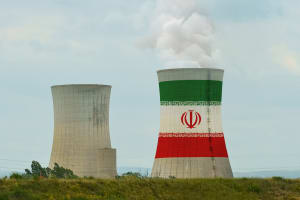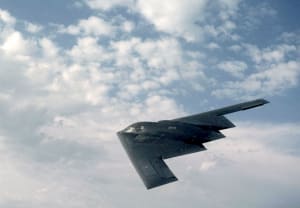Iran displays new missile with 1,200 km range amid tensions with US and Israel

The Iranian Defense Ministry presented on Sunday a new solid-fueled ballistic missile that reportedly has a 1,200 kilometer range (around 745 miles).
The display of the new Iranian “Qassem Basir” missile comes amid ongoing tensions with the United States and Israel due to Iran’s covert nuclear weapons program and its imperialist policies across the Middle East region and beyond.
Iran’s Defense Minister Aziz Nasirzadeh threatened to strike U.S. or Israeli military sites and interests.
"If war is initiated by the U.S. or Israel, Iran will strike their interests, bases and forces wherever they are and whenever necessary," Nasirzadeh announced on the Iranian regime-controlled State TV.
“We have no hostility toward neighboring countries and seek brotherly relations, but in the event of an attack, US bases in the region will be considered legitimate targets,” the Iranian defense minister warned. He claimed that the new ballistic missile is designed to bypass aerial defense systems. The new missile, which reportedly has improved guidance and maneuverability, was tested last month by the Iranian military.
The new missile’s alleged capabilities have not been confirmed by an independent source. The Iranian regime which threatens moderate Arab states and openly calls for Israel’s destruction, frequently exaggerates its military capabilities.
The Iranian defense minister’s statement was likely a response to U.S. Defense Secretary Pete Hegseth's recent warning that the Trump administration holds the ayatollah regime accountable for the ongoing aggression by the Tehran-backed Yemen-based Houthi terrorist militia.
“Message to IRAN: We see your LETHAL support to The Houthis. We know exactly what you are doing,” Hegseth recently wrote on 𝕏. “You know very well what the US Military is capable of – and you were warned. You will pay the CONSEQUENCE at the time and place of our choosing,” the U.S. defense secretary warned the Iranian regime.
The Houthis have fired hundreds of missiles and drones against Israel since the Hamas Oct. 7 massacre in 2023. The overwhelming majority of the missiles and drones have been successfully intercepted. However, the Iranian-backed Houthis fired a missile on Sunday morning that landed near Israel's international Ben Gurion Airport.
The Iranian defense minister argued that the Houthis act independently, a claim that is rejected by Washington and Jerusalem as the Houthis would not be able to fire missiles without Tehran’s massive assistance. While the latest Houthi missile caused only minor damage, Israeli Prime Minister Benjamin Netanyahu warned that Israel would respond with strong force against the Houthis and possibly also against the Iranian regime.
U.S. President Donald Trump has stressed that he will not allow the ayatollah regime to acquire nuclear weapons. While Trump has indicated that he prefers a diplomatic solution, the U.S. president has warned that, if necessary, Washington will use military force against Tehran’s nuclear program.
The Israeli analyst Dr. Dan Diker who heads the Jerusalem Center for Security and Foreign Affairs, recently assessed that the Iranian regime is currently weak and vulnerable.
“Iran is at its most vulnerable that it's been in 45 years. And Israel has the opportunity to take military action,” Diker said.
The ayatollah regime’s vulnerability is attributed to a collapsing domestic economy, growing anti-regime sentiments in Iran and the severe degradation of Tehran’s terrorist proxies Hamas and Hezbollah by the Israeli military.
In addition, a large Israeli air strike in October 2024 reportedly destroyed much of Iran’s aerial defenses and missile production capabilities. Military experts therefore assess that Iran is currently vulnerable in the event of a potential U.S. or Israeli military strike on Tehran’s covert nuclear weapons program.

The All Israel News Staff is a team of journalists in Israel.
You might also like to read this:

















